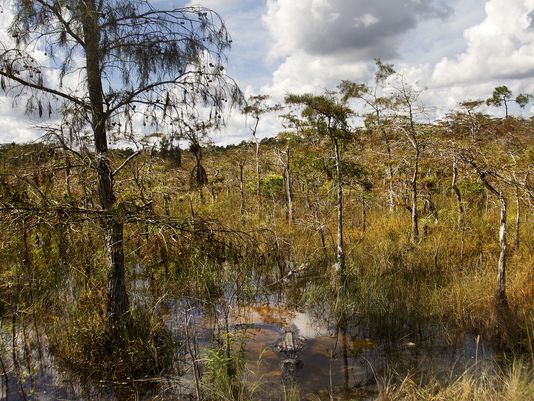http://www.tampabay.com/news/politics/legislature/scotts-stake-in-oil-company-tied-to-collier-drilling-riles/2184342
Friday, June 13, 2014 7:16pm

SCOTT KEELER | Times
Florida Gov. Rick Scott said, “I put everything in a blind trust, so I don’t know what’s in the blind trust.”
TALLAHASSEE — Gov. Rick Scott’s six-figure stake in a French energy company is angering environmentalists because the firm is involved in oil drilling in Collier County, near the Everglades.
Asked if he supports drilling in a county where he owns a $9.2 million home, Scott did not directly answer. He said: “You’ll have to talk to DEP.”
To avoid conflicts, Scott put his wealth in a blind trust three years ago, and an adviser is assigned to manage Scott’s money without his knowledge.
“I put everything in a blind trust, so I don’t know what’s in the blind trust,” Scott said last week.
In 2011, the original blind trust showed a $135,000 investment in Schlumberger Ltd., the world’s largest oil services company.
Its stock has risen steadily over the past year and trades at $107 a share, but the blind trust prevents the public from knowing whether Scott still has a stake in the company — or whether it has grown.
The leader of a citizens group opposed to drilling is one of numerous people alarmed at Scott’s past, and possibly continuing, financial ties to Schlumberger.
“This makes a huge difference to me,” said Joe Mulé, president of Preserve Our Paradise.
Learning of the Schlumberger tie, Mulé said he’s more suspicious of DEP’s layoffs of dozens of employees charged with regulating polluters in 2012.
“It’s very two-faced,” said Alexis Meyer, who runs a Sierra Club program to protect panther habitats in Southwest Florida. “To have a governor who invests our money for Everglades restoration but also supports a company that wants to drill in the Everglades makes me very uncomfortable.”
Schlumberger helped apply for a DEP permit so that a Texas oil company, the Dan A. Hughes Co., can use a drilling technique that uses acid to create cracks in the rock and then a gel mixed with sand to hold the cracks open.
“Schlumberger Water Services has been involved primarily in the permitting of the saltwater injection wells for Dan A. Hughes and has assisted with the oil well permit application,” said Stephen Harris, a Schlumberger spokesman.
Harris said Schlumberger also performed groundwater monitoring and a review of abandoned oil wells on behalf of Collier Resources, which holds the mineral rights to the drill site. Schlumberger has no involvement in drilling operations, he said.
Hughes has denied it has used hydraulic fracturing to crack limestone, a process known as fracking. The company agreed to a $25,000 fine for an unauthorized second acid treatment and, in a consent order with DEP, agreed to hire an independent expert to monitor groundwater for possible contamination.
Hughes’ operation has drawn opposition from Collier residents because the drilling is near a residential area known as Golden Gate Estates and close to the Florida Panther Wildlife Refuge.
The project also has created a major rift between DEP and the Collier County Commission.
Commissioners have voted to challenge the consent order and claim DEP is not demanding enough oversight of Hughes.
The county and residents accused DEP of excessive secrecy in its dealings with Hughes.
DEP urged the county to drop its challenge, saying it will remove any obligations on Hughes until all lawsuits are settled. But DEP on Friday sent the county a more conciliatory letter, saying it “is committed to working with you . . . to be good stewards of Florida’s natural resources.”
Scott’s campaign spokesman, Matt Moon, said the Schlumberger investment was not made by Scott but by an external brokerage, C.L. King & Associates, that manages part of Scott’s portfolio.
Schlumberger was one of more than three dozen securities accounts managed by King that in 2011 had a value of $21.4 million.
Scott’s overall net worth last year was $83.8 million.
“In 2011, Governor Scott disclosed his investment in an externally managed brokerage account,” Moon said. “He placed those assets in a blind trust so he would have no knowledge if his investments in this brokerage account were bought, sold or changed.”
Environmentalists said Scott’s investment in an oil services company raises questions.
“It means that Rick Scott is in this business,” said David Guest, an attorney for Earthjustice. “It changes how you see him if you know he’s an investor in this business.”
Jennifer Hecker of the Conservancy of Southwest Florida said she’s troubled that a geologist from Schlumberger was hired by Collier Resources to reassure the county that old wells were plugged properly and that no contamination resulted.
“The only consultant who says it’s safe is the same consultant who worked on the permitting of the project,” Hecker said.
Scott and the three elected Cabinet members jointly oversee DEP.
Scott has frequently praised the performance of DEP Secretary Herschel Vinyard.
Scott, who faces re-election in November, has said he is proud of his environmental record and cited ending years of litigation over Everglades protection.
“I’m proud of what we’ve done for the environment. There’s always more to do,” Scott said at a DEP event earlier this year.
Scott’s blind trust received the approval of the state Commission on Ethics in 2011. Last year the Legislature passed a law that regulated blind trusts, and the ethics agency approved Scott’s trust a second time.
The law is under challenge in a state lawsuit by Jim Apthorp, a former top aide to the late Democratic Gov. Reubin Askew, who says that blind trusts violate the state Constitution’s requirement that officials provide a “full” disclosure of their finances.
Times staff writer Craig Pittman contributed to this report. Steve Bousquet can be reached at bousquet@tampabay.com or (850) 224-7263.
Scott’s stake in oil company tied to Collier drilling riles environmentalists 06/13/14 [Last modified: Saturday, June 14, 2014 6:19pm]
 Steve Bousquet, Times/Herald Tallahassee Bureau
Steve Bousquet, Times/Herald Tallahassee Bureau
